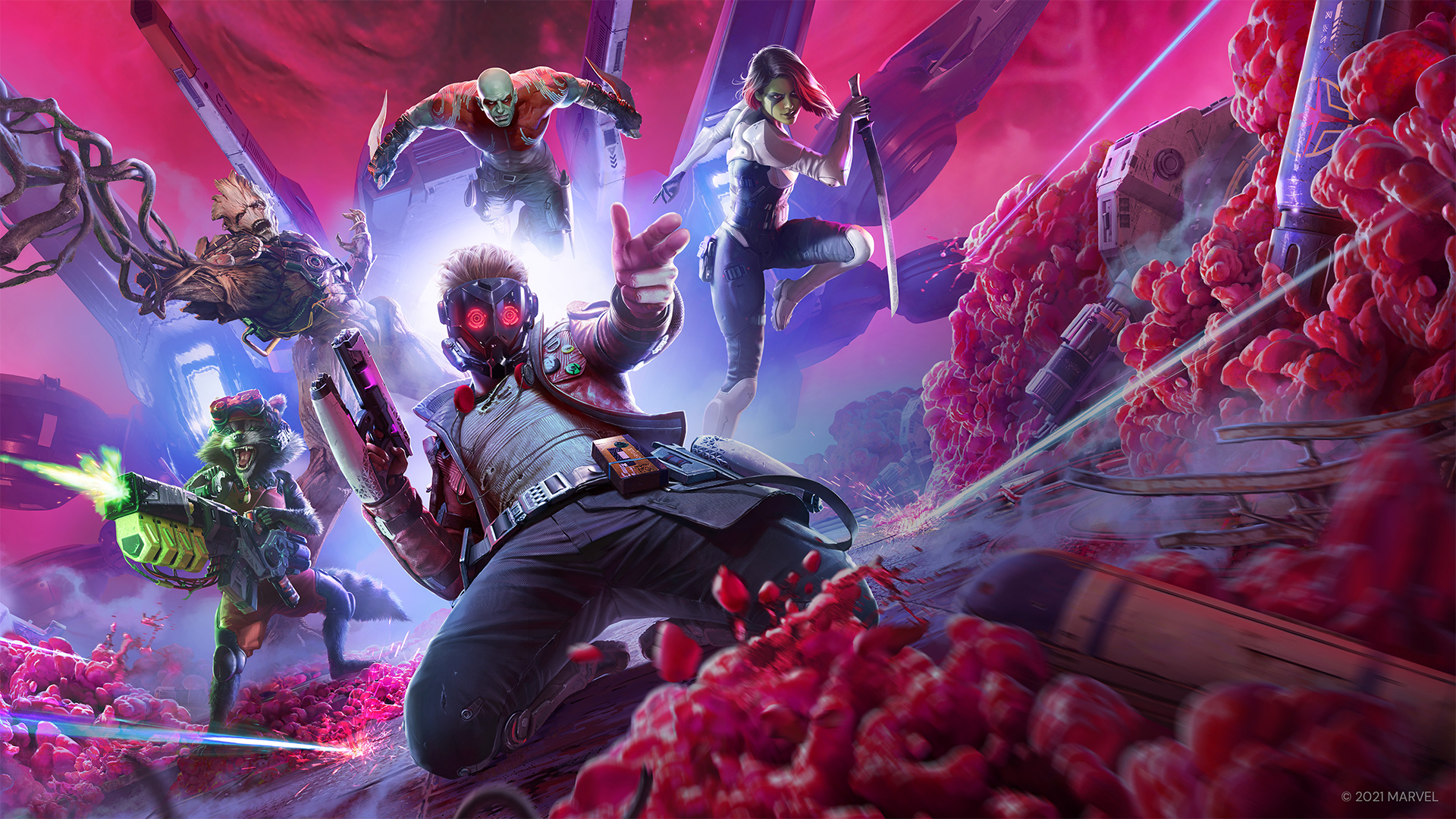
As Square Enix began to unveil Marvel's Guardians of the Galaxy at its E3 2021 showcase, it was difficult to avoid drawing parallels to Marvel's Avengers. The reception of the company's first game based on a famous comic-book ensemble had pretty lukewarm, but here was another of its studios pushing out another offering from the same franchise less than a year later. It makes sense that Square Enix would want to get as much out of its fancy new franchise as possible, but in the nine months since Avengers' release, had Eidos Montreal had the chance to learn from Crystal Dynamic's mistakes?
As the gameplay reveal went on, it seemed more and more likely that it had. While Marvel's Avengers aimed to be a long-term service, it should have been anything but - our review describes "a glittery and joyous core campaign," that ends too soon, and an endgame that's "paper-thin." So when Guardians of the Galaxy was confirmed as a purely single-player experience, those concerns were immediately cast aside. If the developers have been able to focus on a strong campaign rather than splitting their focus with a complicated multiplayer-focused endgame, one of its biggest potential hurdles might already have been cleared.
Peter Quill and friends also have a slight game-related advantage over Earth's Mightiest Heroes in the existence of a more established protagonist. The Avengers has its frontmen, but the team as a whole boasts a pretty flat leadership structure, making it difficult to pin the narrative and gameplay thrust to any one character. In Star-Lord, however, Guardians of the Galaxy has its captain of the ship. Even with Kamala Khan as a worthy narrative lead, Marvel's Avengers' ambitious 'play as everyone 'approach offers an extra barrier when it came to connecting with those characters. In Guardians, making Quill the undeniable leader of the pack offers a number of opportunities to bolster the storytelling. Role-playing elements mean that the decisions you make as captain will change your crews' actions and perceptions of you, knitting all five central characters together whenever the fighting stops.
We have a Groot
The decision to place Star-Lord firmly in the centre of proceedings extends to combat, too. Rather than nominate one character per mission, keeping Quill front and centre whenever a fight breaks out allows far more opportunity to get the other Guardians involved. Quill's signature 'blasters and rocket boots' combo might not be the most innovative form of combat on offer in this far-flung space adventure, but the rest of the team more than makes up for that. The gameplay reveal kept the entire team fighting side-by-side with Peter at all times, but his ability to call on their particular set of skills seems a perfect fit for an ensemble cast seen through the eyes of a single character. Not only do those abilities work well together - like the moment where Groot ensnares an enemy shortly before Rocket blows it to pieces - they also highlight their user's strengths. Gamora and Drax are very different, both in and out of combat, and the former's precise sword strikes are a key part of her character, just as the latter's brute strength speaks to his own highly-literal interpretation of the worlds around him.
The system used to call on each character seems elegant in its simplicity, each team member responding to Peter's calls at the touch of a button. There's a brief cooldown before they can be used again, but the approach immediately makes the Guardians look like a team, rather than a bunch of heroes fighting next to one another. Compare that to Marvel's Avengers, in which combat seems a far more individualistic affair, in spite of the game's multiplayer focus. From that game's own reveal trailer right up to this week's Cosmic Cube event, gameplay is broadly a solo experience, with a few other players having their own adventures somewhere nearby. In putting Quill at the centre of combat, the opportunity to being the rest of the Guardians into the fight makes for an experience that's far more cohesive, bringing its characters together in a way that feels like it's missing from Marvel's Avengers.
It's a shame, then, that the Avengers' game seems like it could so easily have been so similar to this new Marvel game. With voice acting and animations already in place for the former's entire roster of characters, it's not hard to imagine a version of Marvel's Avengers that put single-player first. That kind of change in scope would obviously have been a serious undertaking to pull off, the kind of decision that would have to be made in the very early stages of development. But it's still fascinating to see two such ostensibly similar games - with the same art style, based in the same franchise, both about teams of heroes working together - take such different approaches. Free from the complexity of a multiplayer-focused endgame, Marvel's Guardians of the Galaxy far better positioned to pull off a full-length campaign even more successful than its predecessor's truncated one, which could shape Marvel's interactive offerings for a long time to come.
For more future big-hitters, check out our E3 2021 guide for the best games of the show.
Weekly digests, tales from the communities you love, and more

I'm GamesRadar's Managing Editor for news, shaping the news strategy across the team. I started my journalistic career while getting my degree in English Literature at the University of Warwick, where I also worked as Games Editor on the student newspaper, The Boar. Since then, I've run the news sections at PCGamesN and Kotaku UK, and also regularly contributed to PC Gamer. As you might be able to tell, PC is my platform of choice, so you can regularly find me playing League of Legends or Steam's latest indie hit.


